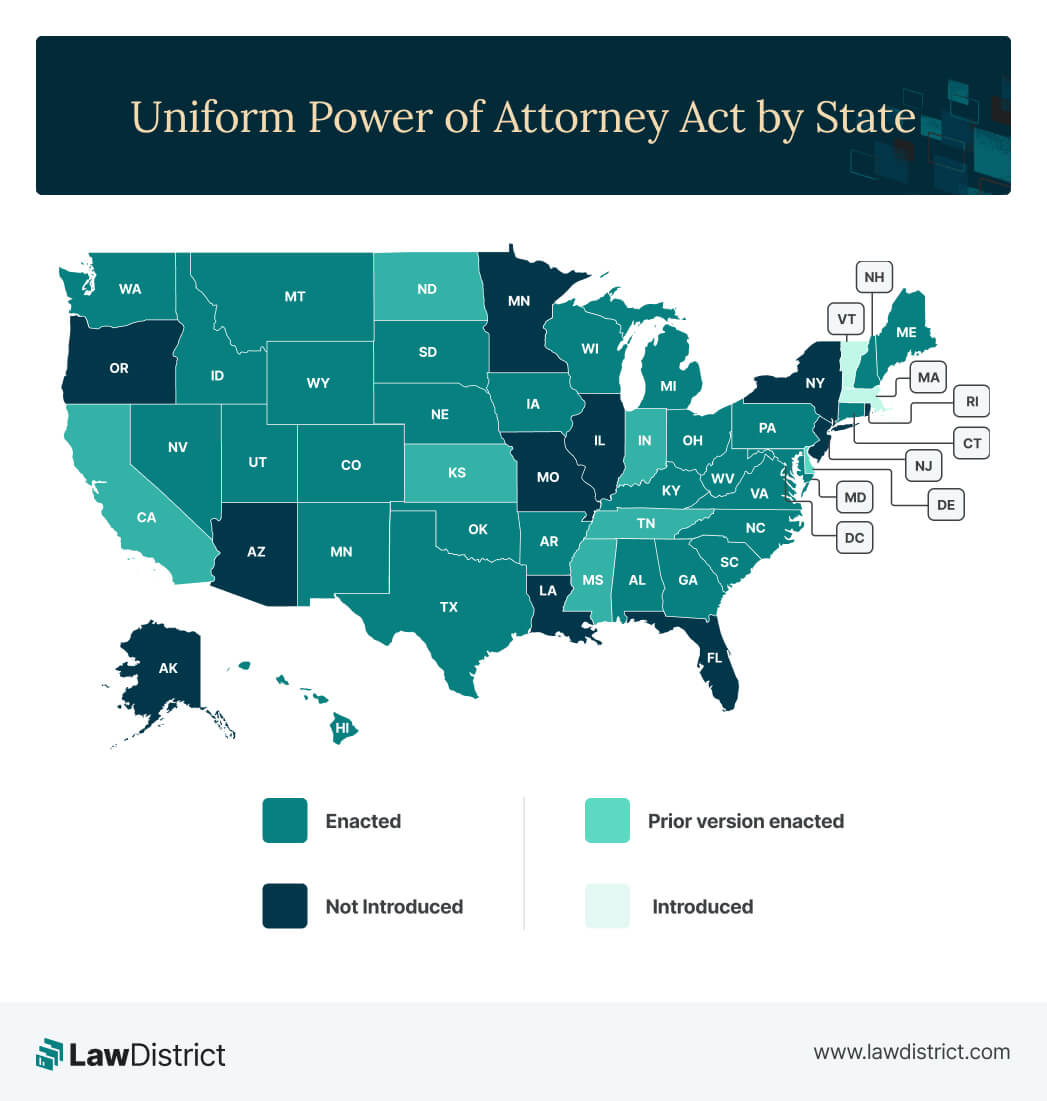In pursuit of standardized laws across the U.S., numerous states have enacted the Uniform Power of Attorney Act (UPOAA) in order to allow Americans to anticipate that their power of attorney agreement will be upheld if they move to another location. Traditionally, powers of attorney are governed by state law and have significant differences from one locale to another.
A power of attorney is a legally binding contractual agreement that assigns decision-making ability to another individual. The principal allows an attorney in fact, also known as an agent, to agree to business deals, buy, sell, or transfer assets, or make medical decisions on the principal’s behalf.
Having a valid and enforceable power of attorney is a vital aspect of comprehensive estate planning.
However, if specific provisions of a power of attorney agreement are not valid where you are located, your planning can be overturned. Therefore, states that adopt the UPOAA provide their residents the peace of mind of knowing their POA will be upheld in other UPOAA compliant jurisdictions.
Read more: Durable vs General POA
As travel and commerce between the states have grown easier in the past century, the problem of differing state laws has become more prominent.
In response, a group of attorneys and judges created the Uniform Law Commission (ULC).
Smoothing out laws between states promotes business and lowers the burdens of moving from one place to another state. The ULC has proposed various standardized, or uniform, regulations, including the UPOAA.
The Uniform Power of Attorney Act was first proposed in 1969.
Since then, the ULC has made numerous adjustments to ensure it keeps up with current needs. The most recent version became effective in 2006. The UPOAA addresses differences in state laws to standardize the power of attorney process. This ensures that POAs from different states will be upheld in other UPOAA compliant jurisdictions.
If a state has adopted all of the UPOAA, its laws will match other states that have signed-on to the UPOAA. Therefore, you and your estate planning professionals can create a power of attorney document that is tailored to your needs and enforceable in other UPOAA states.
Key Elements of UPOAA
Each state can write laws that define the validity, scope, or enforceability of all power of attorney agreements.
For this reason, state POA laws normally differ between on subjects such as:
- Who is a valid agent.
- When is an agent allowed to begin making decisions on the principal’s behalf.
- What powers can be delegated to an agent.
- Compensation for the services an agent provides.
- How a power of attorney relationship can be terminated.
The UPOAA attempts to address these differences to standardize the power of attorney process.
When you draft this document, it's important to understand where it will be valid. After all, the last thing you want is for the agreement to be unenforceable right when you need it.
The UPOAA is broken into the four following articles.
General Provisions
This article is where the most crucial information is located. Here, the UPOAA aims to ensure the protection of the principal while allowing an agent to act broadly on the principal’s behalf.
For example, one key difference between state laws is how to create a durable power of attorney.
To be considered durable, the power of attorney agreement **must remain in effect if the principal becomes incapacitated.
On the other hand, a general power of attorneys automatically terminates if the principal is incapacitated, unless the contract explicitly addresses durability.
The UPOAA flips the traditional standard. Instead, a power of attorney created under the UPOAA lasts through the principal’s incapacity unless the agreement itself calls for termination (§110). This can help ensure the proper execution of your estate planning wishes if you sustain a serious illness or tragedy.
Another critical section of the general provisions of the UPOAA outlines an agent’s duties on behalf of the principal. The agent is a fiduciary of the principal, meaning they must take actions to benefit the principal.
However, the UPOAA protects agents who also benefit from their efforts, so long as the principal received some improved standing.
An agent would not be held liable under the UPOAA if there was a conflict of interest so long as they act with "care, competence, and diligence for the best interest of the principal."
Authority
The second section of the UPOAA concerns what authority is granted through a power of attorney. The Act requires that the principal expressly grant authority to carry out certain actions. This means the power of attorney agreement must contain language giving the agent these powers.
Without an express grant, the agent cannot do any of the following:
- Create or change beneficiaries.
- Alter rights of survivorship.
- Give gifts.
- Make any changes to an inter vivos (living) trust.
- Further delegate the authority created by the power of attorney.
- Control the principal’s electronic communications.
- Waive certain entitlements for the principal.
The UPOAA Authority Section states that, outside these express restrictions, the agent’s powers should be interpreted broadly. Therefore, if someone questions whether an agent has the right to take action in a UPOAA jurisdiction, the agent receives the benefit of the doubt.
The third section of the UPOAA provides a general form and example of plain language to create a power of attorney. By following the included form, you can rely on the agreement being enforceable. However, these templates are difficult to tailor to your specific needs.
Additionally, this section has an example of how signatures should be collected. The UPOAA requires newly created powers of attorney to be notarized. Following this requirement will help an agent defeat any questions of the agreement’s validity.
Other Provisions
Finally, there are a few miscellaneous areas of law addressed by the UPOAA’s fourth section. Crucially, one provision clarifies that powers of attorney created before the UPOAA are valid as long as they complied with the law at the time. Not all agreements need to be updated when a state joins the UPOAA.
States That Have Adopted the Uniform Power of Attorney Act
In 2007, New Mexico was the first state to adopt the UPOAA. Since then, the number of states where the UPOAA is the law has grown to 28. In 2020 alone, Kentucky and South Dakota enacted the standardized law.

Where and when the UPOAA was adopted.
Additionally, Massachusetts and Vermont have introduced legislation to approve the UPOAA.
In Massachusetts, the House Bill No. 1598 adopting the UPOAA is pending concurrence, with a reporting date extended to April 15th 2022, and now it is waiting for further steps.
Similarly, in Vermont, an act adopting the House Bill 536 UPOAA was read to the House on January 1st, 2022, and is waiting for further steps.
Use our template to create a tailored power of attorney that suits your needs and follows your state’s guidelines.
Get a Power of Attorney Here
Definitions
This section provides a summary of definitions from the Uniform Power of Attorney Act, found in the PDF document. Each entry includes the section number and the page where it can be found:
- Agent (Section 102, Page 3): A person authorized to act on behalf of a principal in a power of attorney, including original, co-, and successor agents.
- Durable (Section 102, Page 3): A power of attorney that remains valid even after the principal becomes incapacitated.
- Electronic (Section 102, Page 3): Related to technology with electrical, digital, magnetic, wireless, optical, electromagnetic, or similar capabilities.
- Incapacity (Section 102, Page 3): The inability of an individual to manage property or business affairs due to impairment, absence, detention, or being outside the United States and unable to return.
- Person (Section 102, Page 3): Any individual or legal entity, including corporations, trusts, partnerships, and government agencies.
- Power of Attorney (Section 102, Page 3): A written or electronic record granting authority to an agent to act on behalf of a principal.
- Presently Exercisable General Power of Appointment (Section 102, Page 3): A power that allows the holder to vest absolute ownership in the principal or their estate, creditors, or the creditors of the principal's estate, subject to certain conditions or events.
- Principal (Section 102, Page 3): An individual who grants authority to an agent through a power of attorney.
- Property (Section 102, Page 3): Any real or personal, legal or equitable, interest or right that can be owned.
- Record (Section 102, Page 4): Information inscribed on a tangible medium or stored electronically and retrievable in a perceivable form.
- Sign (Section 102, Page 4): To authenticate or adopt a record with the present intent, either by executing or adopting a tangible symbol or by attaching an electronic symbol, sound, or process.
- State (Section 102, Page 4): A state of the United States, the District of Columbia, Puerto Rico, the United States Virgin Islands, or any territory or insular possession subject to the jurisdiction of the United States.
- Stocks and Bonds (Section 102, Page 4): All types of securities and financial instruments, including shares or interests in various business or investment vehicles.
- Writing or Written (Section 102, Page 4): A record inscribed on a tangible medium or stored electronically and retrievable in a perceivable form.
- Liability for Refusal to Accept Acknowledged Power of Attorney (Section 114, Page 23): A person who refuses to accept an acknowledged power of attorney without reasonable cause may be subject to a court order mandating acceptance, as well as liability for reasonable attorney's fees and costs incurred in any action confirming the power of attorney's validity.
- Definition of "Durable" (Section 102(2), Page 7): A power of attorney that remains in effect even if the principal becomes incapacitated.
- Statutory Form (Section 301, Page 66): The standard form provided in the Act, which can be used to create a power of attorney. It includes instructions, notices, and the specific language required for a valid power of attorney.
- Signing on Behalf of the Principal (Section 301, Page 70): A person may sign the power of attorney on behalf of the principal if the principal is physically unable to sign and the signing is directed by the principal in the presence of two witnesses.
- Agent's Certification (Section 302, Page 74): A document signed by the agent, acknowledging their acceptance of the appointment and certifying the agent's understanding of their duties and responsibilities.
- Agent's Duties (Section 114, Page 23): The agent must act in accordance with the principal's reasonable expectations, act in the principal's best interest, avoid conflicts of interest, preserve the principal's estate plan, and cooperate with the principal's healthcare agent, among other duties.
- Financial Powers (Section 301, Page 68): The statutory form lists specific financial powers that can be granted to the agent, including real property transactions, tangible personal property transactions, stock and bond transactions, and banking transactions, among others.
- Agent's Liability (Section 117, Page 30): An agent who violates their duties may be liable for the harm or loss caused to the principal, as well as any profits made by the agent through the breach of duty.
- Revocation (Section 301, Page 71): The principal may revoke the power of attorney by providing a written notice of revocation to the agent and any third party who may rely on the power of attorney. The revocation is effective when the notice is received by the agent or the third party.
Helpful Resources:
Uniform Power of Attorney Act - ULC
UPOAA by States - ULC



